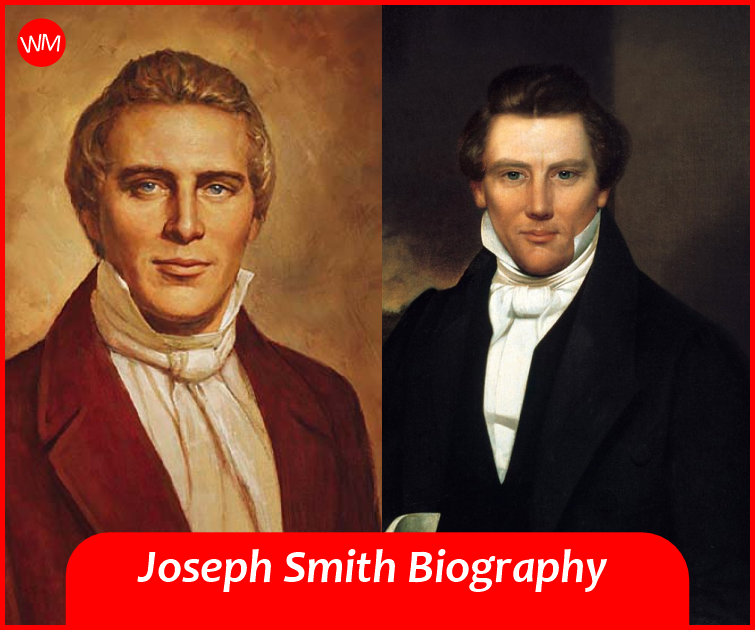
Joseph Smith Biography – Discover the life of Joseph Smith Jr., founder of Mormonism and The Church of Jesus Christ of Latter-day Saints (LDS Church). From humble beginnings in Vermont to his dramatic death at 38, Smith remains one of the most influential—and polarizing—religious figures in American history.
Joseph Smith Jr. (1805–1844) was an American religious leader and the founder of the Church of Jesus Christ of Latter-day Saints (commonly known as the LDS Church or Mormon Church). Revered by followers as a prophet, Smith’s life was marked by spiritual revelations, controversy, and enduring impact on American religious history.
Joseph Smith Biography
📋 Profile Summary
| Field | Details |
|---|---|
| Full Name | Joseph Smith Jr. |
| Date of Birth | December 23, 1805 |
| Place of Birth | Sharon, Vermont, United States |
| Nationality | American |
| Known For | Founding the LDS Church |
| Occupation | Religious Leader, Publisher, Prophet |
| Spouse(s) | Emma Hale Smith (and others via polygamy) |
| Died | June 27, 1844, in Carthage, Illinois |
| Cause of Death | Assassinated in jail by a mob |
🧒 Early Life and Visions
Born in a poor farming family, Joseph Smith grew up in New York during the Second Great Awakening, a time of intense religious revival in America. At age 14, Smith claimed to have had a vision of God the Father and Jesus Christ, which he called the First Vision. This vision, according to Smith, told him not to join any existing denomination.
📖 The Book of Mormon
In 1823, Smith reported an angel named Moroni appeared to him and led him to golden plates buried in a hill near his home. These plates, he claimed, contained ancient records of a lost civilization of the Americas.
Smith translated the plates through divine means and published the Book of Mormon in 1830, the same year he officially founded the Church of Christ, later renamed the Church of Jesus Christ of Latter-day Saints.
🏛️ Leadership and Growth
Smith led his growing community through various locations, including:
- Kirtland, Ohio – Early church organization and temple construction.
- Missouri – Conflict with locals led to expulsion and violence.
- Nauvoo, Illinois – Became a thriving city with its own militia and charter.
He served as the church’s first prophet and president, introducing doctrines like:
- Modern prophecy
- Baptism for the dead
- Plural marriage (polygamy) – highly controversial then and now
⚔️ Persecution and Death
Tensions with outsiders over church doctrines, growing political power, and rumors of polygamy fueled hostility. In 1844, Smith and his brother Hyrum were jailed in Carthage, Illinois.
On June 27, 1844, a mob stormed the jail and assassinated both brothers. Smith died at age 38, regarded as a martyr by his followers.
🌍 Legacy
Today, over 17 million people worldwide identify as Latter-day Saints. The church Smith founded has evolved but continues to honor him as a prophet and restorer of true Christianity.
His legacy is complex:
- Revered in LDS circles as a divinely inspired prophet
- Criticized in others for his teachings on polygamy, race, and religious authority
- Studied by historians as a major figure in American religious innovation
📚 Notable Writings and Works
- The Book of Mormon (1830)
- Doctrine and Covenants – compilation of revelations
- The Pearl of Great Price – sacred LDS text
A Prophet’s Life: Visionary and Controversial
Joseph Smith’s biography is a blend of spiritual conviction, societal upheaval, and enduring legacy. Born in 1805, he claimed a series of divine visions that led him to restore what he believed was true Christianity. At just 24, he published the Book of Mormon, which he said was translated from golden plates shown to him by an angel named Moroni. By his death in 1844, he had established a new faith and led tens of thousands of followers.
Early Life: Faith Born in Poverty
Smith was the fifth of 11 children born to Joseph Sr. and Lucy Mack Smith. After repeated crop failures, his family moved to Palmyra, New York, in 1816. At age seven, Joseph suffered a severe leg infection that required surgery without anesthesia—an early sign of his resilience. His mother described him as imaginative and thoughtful.
Education: A Seeker Without Schooling
Due to poverty, Smith had little formal education, learning the basics of reading, writing, and arithmetic at home. His real education came through extensive Bible study during the fervent religious climate of the Second Great Awakening.
Career: Founder of a New Faith
The First Vision and the Book of Mormon
At 14, Smith claimed to see God and Jesus Christ in what became known as the “First Vision.” Later, in 1823, he said the angel Moroni revealed ancient golden plates, which he translated into the Book of Mormon by 1830. While critics question its origins, followers view it as divinely inspired scripture.
Founding the LDS Church
Smith officially established the Church on April 6, 1830, in Fayette, New York. He and his followers moved repeatedly—from New York to Ohio, Missouri, and finally Nauvoo, Illinois—often facing violent opposition. In Nauvoo, he served as both mayor and militia leader, building a city of over 12,000 people.
Controversy and Death
Smith’s leadership drew increasing scrutiny. His introduction of polygamy, reportedly marrying over 30 women, and his 1844 presidential campaign heightened tensions. After ordering the destruction of the Nauvoo Expositor newspaper for criticizing polygamy, he was arrested. On June 27, 1844, a mob killed Joseph and his brother Hyrum in Carthage Jail.
Financial Life: Modest in Death
Despite leading a growing religious movement, Smith likely died with under $100,000 in assets (roughly $3 million today). His ventures, including the failed Kirtland Safety Society bank, reflected both ambition and financial instability.
Memorable Quotes
- “No man knows my history.” — 1842
- “The Book of Mormon is the most correct of any book.” — 1841
- “I saw a pillar of light exactly over my head.” — 1838
Legacy: Lasting Impact
Smith’s influence endures. The LDS Church now has millions of members worldwide. He remains revered by followers as a prophet and criticized by others as a religious opportunist. His theological innovations, like baptism for the dead and eternal marriage, continue to shape Mormon doctrine.
Family and Personal Life
Smith married Emma Hale in 1827. The couple had 11 children, though only four survived infancy. His parents and siblings, particularly Hyrum, played key roles in his early religious efforts. Polygamy strained his relationship with Emma, a tension often cited in historical accounts.
Recognition: Prophet or Pariah?
Smith received no formal honors in his lifetime. However, leaders like Boston’s Mayor Josiah Quincy recognized his significant cultural influence, calling him a man who “shaped the minds of men.” Today, the LDS Church honors him as its founding prophet.
What’s New in 2025?
Two major biographies are slated for release in 2025:
- Joseph the Prophet by Richard Turley – A Church-commissioned, accessible look at Smith’s life and teachings.
- Joseph Smith: The Rise and Fall of an American Prophet by John Turner – A scholarly, critical examination of his influence.
Conclusion
Joseph Smith’s life story is one of conviction, complexity, and controversy. From translating the Book of Mormon to founding a religion that spans the globe, his influence is undeniable. At just 38 years old, he left behind a movement that still shapes religious discourse today. The 2025 biographies promise fresh insights into this enduringly controversial figure.
❓ FAQs About Joseph Smith
1. What religion did Joseph Smith start?
The Church of Jesus Christ of Latter-day Saints, also known as Mormonism.
2. How did Joseph Smith die?
He was assassinated in jail by an armed mob in 1844.
3. Is the Book of Mormon based on the Bible?
It is considered a companion scripture to the Bible by LDS members, but it presents a separate record of ancient American peoples.
4. Did Joseph Smith practice polygamy?
Yes, historical records confirm he had multiple wives, though this was hidden from public view during much of his life.
5. Is Joseph Smith worshipped?
No, LDS members revere him as a prophet, but only worship God and Jesus Christ.





